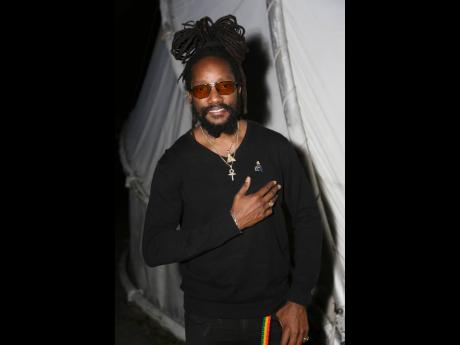Kabaka Pyramid says reggae music needs a party culture
‘Everything is oriented around dancehall and soca’
Rastafarian reggae singer Kabaka Pyramid is that people person who is only too aware of his responsibility as an ambassador of the music, whether in Jamaica or abroad. And he gives off the vibes of being just at home striding the halls of academia as he would be backstage at the Bob Marley birthday celebration.
Simply put, the Grammy Award-winning artiste is a thinker, and he was willing to share his thoughts on how to move reggae music forward, even as he shone a flashlight on the selfishness of some persons in the music business.
“I think what reggae music is missing now, in Jamaica especially, is a party culture around reggae. Right now, when it comes to big parties, everything is oriented around dancehall and soca, and, because of that, reggae artistes and their music becomes like a niche. It’s only being played in small circles and at small events and, because of that, the younger artistes not getting the exposure and the development,” Kabaka said, pausing now and again, flashing a genuine smile at persons who came to hail him up.
He has already envisioned what the reggae party scene that he would love to see would look, sound and feel like.
“Selectors playing reggae songs ... one drop, steppers, roots, dub ... but with people dancing and having fun. It would provide a platform where young artistes can have dem music a play inna big party and dem can get big forward and really cement themselves and keep the industry moving,” the Nice Up the Dance singer stated.
In 2013, Kabaka Pyramid was named the Jamaica Reggae Industry Association’s Breakthrough Artiste of the Year and, 10 years later, he won both the Grammy Award and the Caribbean Music Award for Best Reggae Album. He is passionate about his mission and not afraid to call a spade a spade.
“We need to create a fun experience for young people because, without that, they really won’t gravitate towards reggae music. Other than live music shows, there is nowhere people get excited to go listen reggae. All the weekly dances are just dancehall. Dem maybe play a little reggae at the start and that’s it, dem don’t play reggae in prime time anymore. But I believe that, if a scene develops, dem will be forced to play the songs because there is a vibe around the songs, a vibe around the artistes, and then artistes getting more hit songs,” Kabaka theorised.
Having toured Europe, North America and the Caribbean, Kabaka is well versed on the way artistes operate in other territories, and that has helped to shape his own vision.
“I would really love to see artistes who are more established carrying younger acts with them on tour and really setting up that structure. In the US ... these reggae bands from California and Maryland and Florida ... they have a whole system where the biggest bands carry the second-tier, third-tier, and fourth-tier bands on the road with them. So, if you just starting out and you have a good band and a good team, you get to go on the road and perform in front of 10 and 15 thousand people,” he shared.
“So I would love to see us being less selfish and even see investment groups investing in artistes so that they can fund artistes to carry their teams on the road. The visas are expensive; the flights [are]expensive; but if we develop that system, the entire industry will benefit and start to move like a machine. So those are some of the things that I want to see happening in the industry,” Kabaka declared.
He remains hopeful that more people will come to think like this “about the whole ... about a collective”.
“But everybody is selfish, we are in a very selfish country. I can tell you that,” Kabaka said dejectedly.

